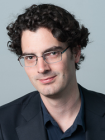Han Thomas Adriaenssen nominated for Wetenschapstalent 2017
Han Thomas Adriaenssen, assistant professor in the Philosophy department, has been nominated for the title of New Scientist Wetenschapstalent 2017 of the Dutch edition of New Scientist.
Every scientific or philosophical revolution has winners and losers. We often forget the losers, although some of them have very convincing arguments. Han Thomas Adriaenssen is researching the ideas of largely unknown thinkers. He shows that the questions and doubts they expressed played an important part in the development of modern science and philosophy in the Dutch Golden Age, the era in which science flourished in the northern Netherlands. Adriaenssen also discovered that the process of scientific and philosophical innovation in the Golden Age was more gradual than previously assumed. He hopes that his research will help to establish how the titanic struggle between Aristoteles’ philosophy and Descartes’ mechanical worldview led to the scientific view of the world we hold today.
Adriaenssen recently published Representation and Scepticism from Aquinas to Descartes with Cambridge University Press.
More about Han Thomas Adriaenssen

More news
-
08 December 2025
Citizen participation essential for a sustainable energy future
-
02 December 2025
Trust in science requires integrity in communication
-
28 October 2025
The search for responsibility in the financial world
